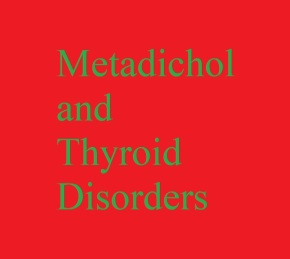 Metadichol has shown that it is effective in treating many maladies. It is not a drug with one target. It is a food substance that acts on many targets including genetic expression and controlling nuclear receptors. Metadichol is a nanoemulsion of long chain alcohols that are commonly found on most plants. We have lost access to this vital nutrient because of processing foods.
Metadichol has shown that it is effective in treating many maladies. It is not a drug with one target. It is a food substance that acts on many targets including genetic expression and controlling nuclear receptors. Metadichol is a nanoemulsion of long chain alcohols that are commonly found on most plants. We have lost access to this vital nutrient because of processing foods.
The paper presented shows many case studies with thyroid disorders. Metadichol acts on many of the nuclear receptors that are necessary for a healthy thyroid. This is for both hypothyroidism and hyperthyroidism. Again, Metadichol acts on multiple targets for the thyroid and other physiology to bring the body to homeostasis.
Metadichol® A Novel Inverse Agonist of Thyroid Receptor and its Applications in Thyroid Diseases
Abstract
An estimated 200 million individuals worldwide have a thyroid disorder. Thyroid diseases affect seven times more women than men. People not diagnosed make up the majority of thyroid patients. There is a need to find novel and safe ways to change the underlying disease processes, rather than merely stop excess thyroid hormone production as in hyperthyroidism.
Metadichol® is a nano emulsion of an extract of long-chain alcohols from food that is an inverse agonist of VDR (Vitamin D receptor), AHR (Aryl Hydrocarbon Receptor), and RORC (RAR Related Orphan Receptor C). The work presented here shows that Metadichol® is an inverse agonist of THRA (Thyroid Receptor Alpha) and THRB (Thyroid Receptor Beta). Case studies are presented that show how it can safely treat a multitude of thyroid related diseases. Network and pathway enrichment studies are presented that show how Metadichol® may be involved in action on multiple receptors and exerting its effects through multiple pathways. Metadichol® is the first of a breed of molecules that moves the goal post from the concept of ‘one drug, one target’ toward simultaneously targeting multiple targets, that can potentially lead to successful treatment of many diseases. Given the safety profile of Metadichol®, it would not only mitigate thyroid disease but prevent it and reducing the burden on healthcare budgets worldwide.
Link to paper:Metadichol-Thyroid-paper
Unfortunately, the paper does not discuss iodine deficiency which is the underlaying problem with the thyroid. The other issue is that there may also be a selenium deficiency. Selenium is necessary to convert T4 to T3 at the cellular level. Suggest that you read the work of Dr. David Brownstein, an endocrinologist and an expert in the thyroid and other iodine deficiency diseases.
Also, vitamin D3 deficiency is responsible for most autoimmune diseases. Be sure that you test your 25(OH)D3 levels. The level, if you are in a disease state, should be high normal in the normal range of 30 to 100 ng/ml (suggest 80 +/- 10 ng/ml). –Mark Pegram
